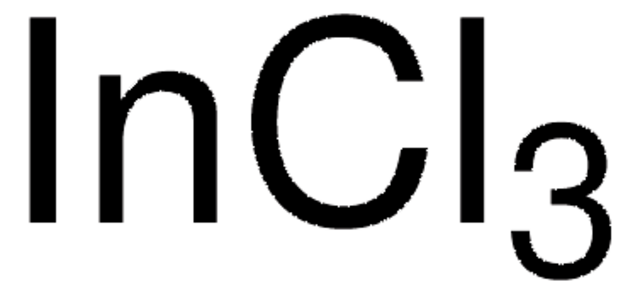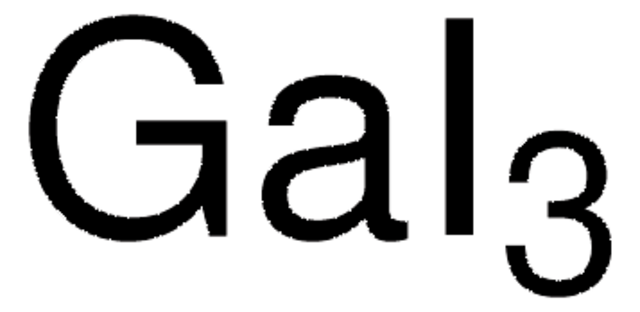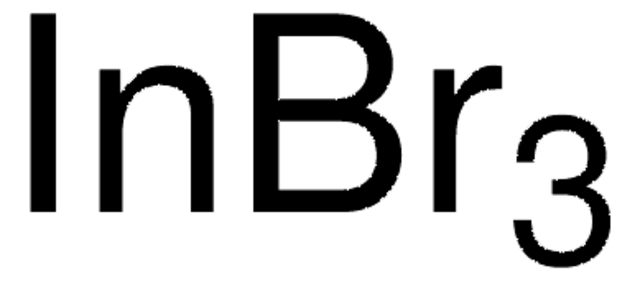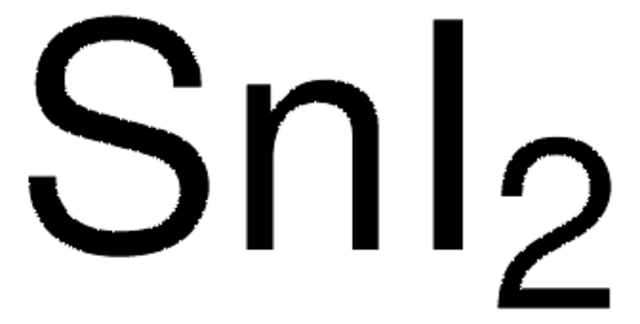578606
Indium(I) iodide
anhydrous, powder, 99.999% trace metals basis
Synonym(s):
Indium monoiodide
About This Item
Recommended Products
grade
anhydrous
Quality Level
Assay
99.999% trace metals basis
form
powder
reaction suitability
reagent type: catalyst
core: indium
impurities
≤15.0 ppm Trace Metal Analysis
SMILES string
[In]I
InChI
1S/HI.In/h1H;/q;+1/p-1
InChI key
FOVZCYAIUZHXGB-UHFFFAOYSA-M
Looking for similar products? Visit Product Comparison Guide
Application
- Selective recovery of indium from iron-rich solutions using an Aliquat 336 iodide supported ionic liquid phase (SILP): This study investigates the selective recovery of indium via adsorption by forming indium iodide complexes, demonstrating a preference for indium over iron (Van Roosendael et al., 2019).
- Experimental evaluation of indium (I) iodide as a lead-free perovskite-inspired material for photovoltaic applications: This research explores the photovoltaic properties of indium(I) iodide thin films, suggesting its potential as an eco-friendly alternative in solar cell technologies (Ustinova et al., 2022).
- Photovoltaic effect in Indium (I) iodide thin films: The study focuses on the deposition and photovoltaic effects of indium(I) iodide films, evaluating its viability for photovoltaic applications (Dunlap-Shohl et al., 2018).
- Indium-mediated stereoselective allylation: This publication discusses the indium-mediated allylation processes, particularly the use of indium(I) iodide, highlighting its efficiency and selectivity in organic synthesis (Kumar et al., 2016).
- Copper-catalyzed and indium-mediated methoxycarbonylation of unactivated alkyl iodides with balloon CO: The article covers the development of a method using indium(I) iodide for the methoxycarbonylation of alkyl iodides, providing a new pathway for ester formation (Chen et al., 2019).
accessory
Signal Word
Danger
Hazard Statements
Precautionary Statements
Hazard Classifications
Acute Tox. 4 Oral - Eye Irrit. 2 - Resp. Sens. 1 - Skin Irrit. 2 - STOT SE 3
Target Organs
Respiratory system
Storage Class Code
11 - Combustible Solids
WGK
WGK 3
Flash Point(F)
Not applicable
Flash Point(C)
Not applicable
Personal Protective Equipment
Choose from one of the most recent versions:
Already Own This Product?
Find documentation for the products that you have recently purchased in the Document Library.
Customers Also Viewed
Articles
Colloidal quantum dots (CQDs) are semiconducting crystals of only a few nanometers (ca. 2–12 nm) coated with ligand/surfactant molecules to help prevent agglomeration.
Our team of scientists has experience in all areas of research including Life Science, Material Science, Chemical Synthesis, Chromatography, Analytical and many others.
Contact Technical Service









